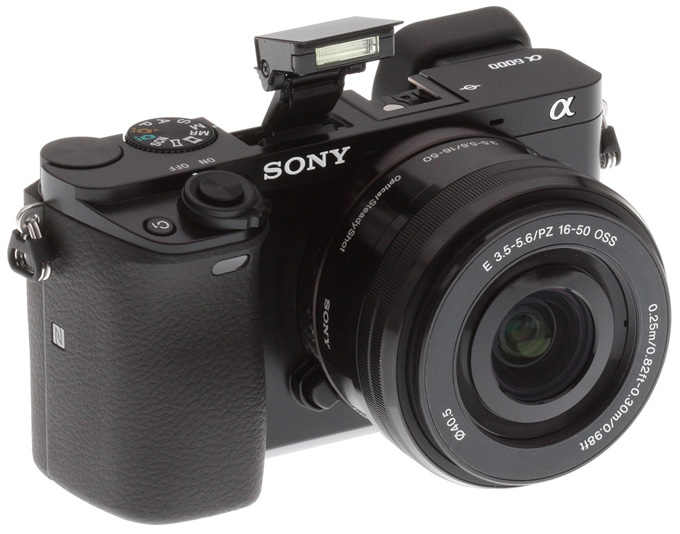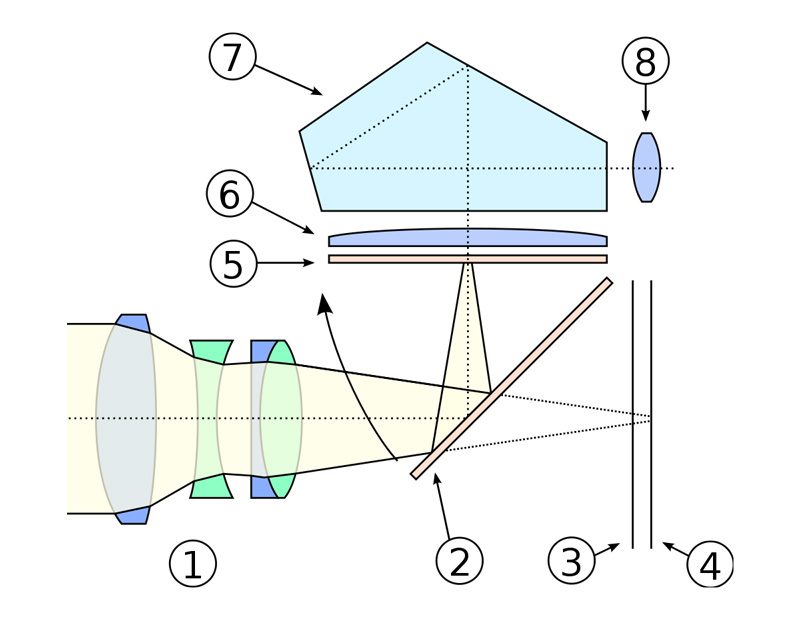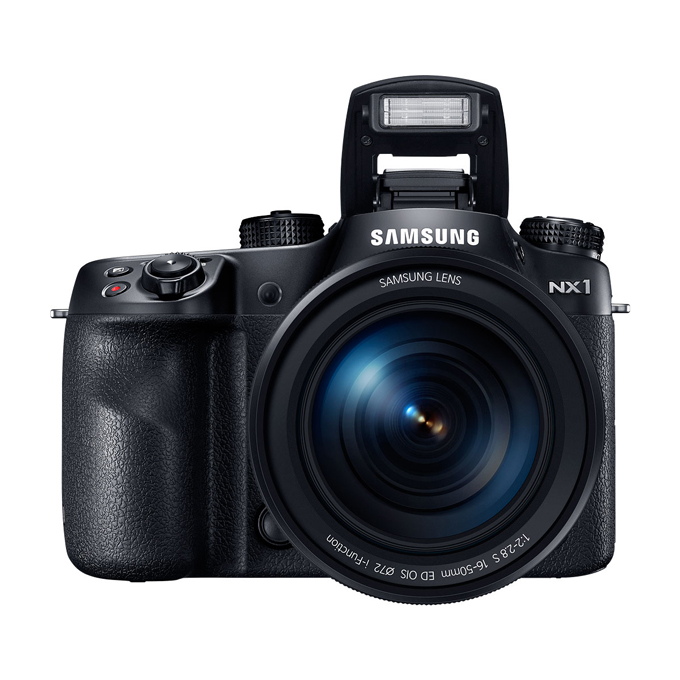“Mirrorless” cameras are getting good. Really good. While we’ve all been discussing the death of the point-and-shoot at the hand of the iPhone, mirrorless cameras have gradually been making their way into the professional category by boosting quality and performance. But how far have they really come? Can a professional photographer really scrap DSLRs and go mirrorless?
I’m a Skeptic
I’ve been shooting with my DSLR for years and I simply love it. Aside from maybe one day dropping my 5D Mark II in favor of a Mark III, I didn’t think any argument would have me questioning my choice in gear any time soon. That being said, I’ve seen a lot of top-notch shooters singing the praises of cameras like the Sony a6000 lately, and it has my interest piqued to say the least.

The Sony a6000
What is a “Mirrorless” Camera?
DSLRs take light in through the lens, bounce it around in a box, then direct it to the viewfinder so you can see what your camera sees.

Image credit: Wikimedia Commons
In contrast, a mirrorless camera simply displays what the sensor is recording, doing away with the need for a mirror assembly (DSLRs also have this option, but still need the mirror for the viewfinder).
What’s The Benefit of Going Mirrorless?
So there’s no mirror, big deal right? What’s the tangible benefit here? There are a few actually.
Size and Weight
If you’ve ever had a shoot last 8-10 hours, you’ll know that lugging around a DSLR that seemed light at the beginning of the day gets old pretty fast. Mirrorless cameras tend to be smaller and lighter than their DSLR counterparts, saving room in your camera bag and postponing that inevitable neck surgery by a few years.
Price
Mirrorless cameras are also typically cheaper than a DSLR by a few hundred bucks or more, and as we’ll see later, you can often achieve comparable specs. That being said, like DSLRs, there are mirrorless cameras for every budget and you can certainly find high end models north of ,500.
Live View Only?
Since you’re ditching the mirror, there’s no viewfinder, which means you can only do live view shooting. Some sites list this as a pro for various reasons, but I’m not exactly convinced that taking away a feature constitutes a benefit. DSLRs have live view shooting and viewfinders, so I’m giving this one to the DSLRs. Feel free to disagree!
It Can’t Possibly Match My Specs, Can It?
Here’s the real question. If you’re used to DSLR quality photography, will you have to sacrifice your expectations to move to a mirrorless camera?
Megapixels
My beloved Canon 5D Mark II has 21.1 megapixels, the upgraded Mark III has 22.1. Beat that mirrorless! Not so fast, the Samsung NX1 is cheaper (around ,500) than either of those cameras and has a whopping 28.2 MP. Heck, even the Sony a6000, mentioned above, has 24.3 MP and can be found for about 0.

The Samsung NX1
ISO
Frankly, I don’t give a rip about megapixels. For me, it’s all about the low light performance, which means we’re talking ISO. The standard ISO range on my 5D Mk II is 100-6400, expanded up to 50-25,600. Cheaper mirrorless cameras typically have around a 100-25,600 range while the more expensive models like the Sony Alpha a7 match my DSLR at 50-25,600 (some of these cameras can even extend that to 51,200!).
Note that ISO range ≠ ISO performance. Some cameras perform better at ISO 3200 than others at ISO 800. For that, Photographylife has a nice color noise comparison of shots taken with various mirrorless models.
Video
I’ve got it! My 5D Mark II doubles as a video camera! It shoots full HD video. There’s no way your dinky little mirrorless models can do that, right? Wrong. Most good mirrorless cameras can tackle HD video. In fact, some of them, like the Samsung NX1, even shoot 4K video, with tracking autofocus to boot.
Going Mirrorless: The Cons
By now it probably looks like I’m only going to sing the praises of mirrorless cameras, but as I mentioned, I’m a deeply skeptical person when it comes to giving up my Canon, so I was eager to dig into the downsides of going mirrorless. Here are a few.
Battery Life
Smaller cameras equate to smaller batteries. Some of the more affordable mirrorless cameras boast a 320 shot battery. Hold the phone. 320 shots!? I take more than 320 photos at a wedding before I ever even see the bride and groom.
I can shoot all day on my 5D Mark II. 90% of the time, I make it through an 8 hour wedding on a single battery, and we’re talking 2,000+ photos. The mirrorless Panasonic GH4 is supposed to get 500 shots per battery, which is admittedly better than 320, but still far from ideal in my book.
Lenses
One thing that makes “professional” mirrorless lines better than your mom’s point-and-shoot is the fact that they have interchangeable lenses. For major brands like Sony, you’ll definitely be able to find some beautiful, high quality lenses. That being said, these cameras simply aren’t as established as major DLSR lines like Canon and Nikon, so you’re not going to find the depth or breadth of lens options that you’re used to. And no, your current lenses aren’t going to work, so you’ll be starting from scratch.
You Might Not Look as Cool
This one is totally superficial, but many photographers secretly think of it right away. When I walk into a wedding with my 5D Mark II with a Canon 70-200 on the front, I get lots of oohs and ahhhs. It’s a huge setup and it makes me look like I know what I’m doing, even if it does kill my back to the point that I’m limping by the end of the day.
Now, if you walk in with a mirrorless camera, odds are, the guests at the wedding will have cameras that are bigger than yours. This might cause you to feel inferior, or worse, cause your clients to make you think you’re really just an amateur.
As far as I’m concerned, if I think a camera is the best tool for the job, I’ll use it and let my photos do the talking.
Which Mirrorless Cameras are the Best?
Tomsguide has a great comparison of some of the best and most affordable mirrorless cameras on the market. Here are some of the models that they favor in that review:
- Samsung NX300 (Best Mirrorless Camera for Beginners)
- Sony Alpha a6000 (Best Intermediate Mirrorless Camera)
- Samsung NX30 (Best Mirrorless Camera for Enthusiasts)
- Olympus OM-D EM-1 (Best Rugged Mirrorless Camera)
- Sony Alpha a7 (Best Pro Mirrorless Camera)
- Panasonic GH4 (Best 4K Mirrorless Camera)
- Samsung NX1 (Best Pro/4K Mirrorless Camera Candidate)
- Sony Alpha a5100 (Best Midrange Mirrorless Camera Candidate)
Who’s Talking About Mirrorless Cameras?
Mirrorless cameras sound all well and good, but can a pro really consider replacing his/her DSLR kit with a mirrorless setup? Here are some videos of pros talking about how much they love mirrorless cameras.
10 Reasons Why a Professional Photographer Left Nikon and Started Shooting with Sony
In this video, photography Jason Lanier discusses why he switched to mirrorless cameras. I highly recommend giving this a watch as it was the catalyst for my endeavor to delve into the world of mirrorless cameras.
The Mirrorless Revolution
In this video, Michael Reichmann & Kevin Raber discuss how they believe the DSLR market will begin shrinking as the mirrorless camera segment grows.
(This video was not embeddable, go here to watch.)
Studio Portraits with Mirrorless Cameras and Off-Camera Flash
Worried about what mirrorless means for your off-camera flash shots? Me too. Here Joe Brady with Picket Wizard gets some awesome results with a mirrorless/off camera flash setup.
What Do You Think?
Whether you shoot with a DSLR or a mirrorless camera, I’d love to hear your thoughts. Do you think mirrorless cameras are the future? Would you consider buying one any time soon? In ten years, will the DSLR still hold its position as the number one choice for professional photographers? Leave a comment below and let me know what you think.
Header image created using Nature photographer..
Josh Johnson is the Inbound Marketing Manager for Creative Market. He’s equal parts writer, editor, designer, and photographer.
Should You Drop Your DSLR and Go Mirrorless?
No comments:
Post a Comment
Note: Only a member of this blog may post a comment.